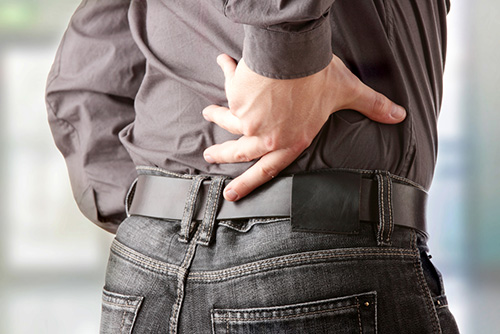So what causes back pain? There are tons of things that lead to back pain, and many are due to mechanical problems with the back itself. Back pain can also be a result of certain conditions, diseases, infections, and stress. Pretty much anyone and everyone is at risk for developing back pain at some point in their life. However, there are some things that can put a person at greater risk; those would include:

Age – Back pain is more common the older you get.
Lack of physical fitness – Back pain is more common in those who are not fit.
Carrying around too much weight – Being overweight can place undue stress on the back and cause pain.
Heredity – Some causes of back pain, such as ankylosing spondylitis, a form of arthritis that affects the spine, can have a genetic component.
Other diseases – Some types of arthritis and cancer can cause back pain.
Your job – Doing work where you’re required to lift, push, or pull while twisting your spine can cause back pain. Don’t think that sitting at a desk all day makes your exempt– even if your job is relatively sedentary, back pain can still occur if you’re doing things like not sitting up straight.
Smoking – Smoking can cause your body to not be able to get enough nutrients to the disks in your back. Smoker’s cough may also cause back pain. Plus, people who smoke are slow to heal, so back pain may last longer.
Back pain can also be caused by a number of other issues, such as disc degeneration, spasms, sprains and strains, ruptured discs, spinal stenosis, pregnancy, and endometriosis.
Some of the most effective ways to prevent back pain include the following:
Exercise – Exercising helps to keep our bodies, including our backs, strong and healthy.
Watch your weight – Maintaining a healthy weight can help your back immensely. The less work it has to do to carry around excess weight, the better.
Diet – Make sure that you’re eating a healthy diet and you’re getting the recommended amount of calcium and vitamin D every day.
Body mechanics – Do your best to always stand up straight and avoid heavy lifting whenever possible. If you do need to lift something heavy, bend your legs and keep your back straight.
Unfortunately, sometimes back pain sneaks up on us even when we’re taking all the necessary precautions. If you’re experiencing back pain that’s accompanied by numbness or tingling, have severe pain that does not improve with rest, pain after a fall or an injury, or pain accompanied by difficulty urinating, weakness, numbness in your legs, fever, and/or unintended weight loss, a visit to the doctor is probably in order.

